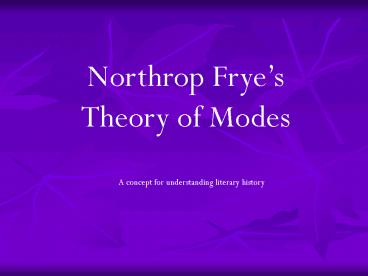Northrop Fryes Theory of Modes - PowerPoint PPT Presentation
1 / 9
Title:
Northrop Fryes Theory of Modes
Description:
MIMETIC ('mimetic' from Greek 'mimesis,' meaning to imitate reality in art) ... LOW MIMETIC (a typical example is the 19th-century novel) If the hero is to us... – PowerPoint PPT presentation
Number of Views:206
Avg rating:3.0/5.0
Title: Northrop Fryes Theory of Modes
1
Northrop Fryes Theory of Modes
A concept for understanding literary history
2
What is literary history?
Is it just a random pile of books?
OR
Can we discern some order in the way literature
has evolved over time?
3
Maple leafs remind us that Frye lived and taught
in Toronto ?
Modes depend on whether the hero of a literary
work is
According to literary critic
Northrop Frye, over the course of history,
literature has gone through five different
modes.
Canadian
BETTER than
the SAME as
or WORSE than
us.
4
If the hero is in kind to us
SUPERIOR
then the hero is a god, and the literary work is
a myth.
5
According to Frye, the mode of romance is
especially characterized by the moon ?
If the hero is a human being who is superior to
us, and to his environment
then the hero is a knight, and the literary work
is a romance, a typically medieval mode.
6
but is a part of the environment
HIGH MIMETIC
If the hero is superior to us,
Welcome to the Renaissance!
(mimetic from Greek mimesis, meaning to
imitate reality in art)
then the hero is a leader, and the mode is
called
7
(a typical example is the 19th-century novel)
If the hero is one of us
then we have a realistic work, and the mode is
LOW MIMETIC
8
If the hero is to us
INFERIOR
then the mode is IRONY
with modernisms emphasis on scenes of
absurdity, hopelessness, and mechanization
9
110.43. English II (One Credit).
(8) Reading/variety of texts. The student reads
extensively and intensively for different
purposes in varied sources, including world
literature. The student is expected to
(C) read world literature, including classic and
contemporary works and (D) interpret the
possible influences of the historical context on
a literary work.
(11) Reading/literary concepts. The student
analyzes literary elements for their
contributions to meaning in literary texts. The
student is expected to (F) understand literary
forms and terms such as author, drama, biography,
autobiography, myth, tall tale, dialogue, tragedy
and comedy, structure in poetry, epic, ballad,
protagonist, antagonist, paradox, analogy,
dialect, and comic relief as appropriate to the
selections being read.































